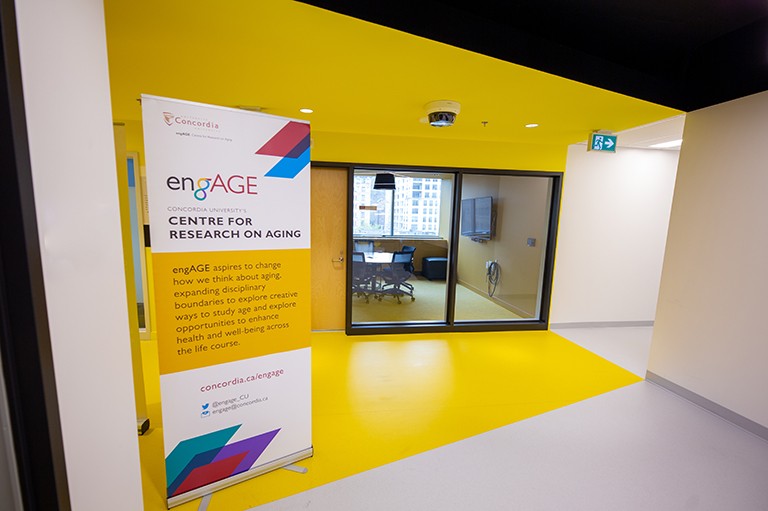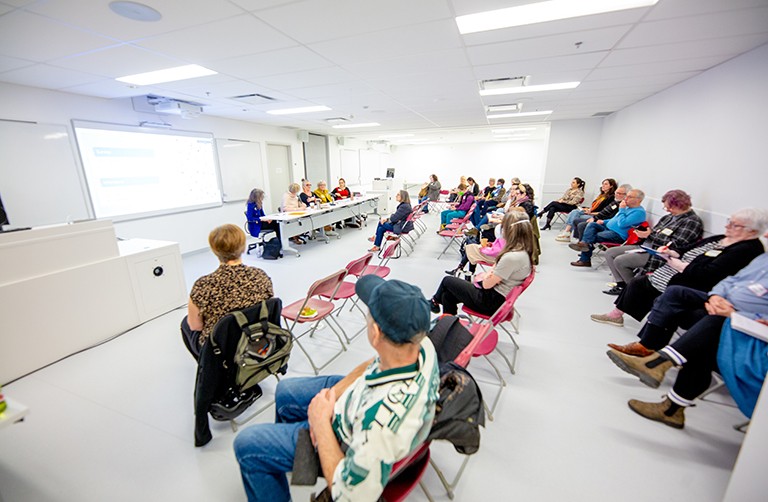Concordia’s engAGE Centre for Research on Aging has a new space

engAGE: Concordia’s interdisciplinary Centre for Research on Aging is opening the doors to its new offices on the sixth floor of the ER Building. The centre, previously located in the Samuel Bronfman Building, aspires to change how we think about aging.
engAGE brings together researchers, students, artists, community partners, policy makers and older adults to explore creative ways to study age. The centre aims to think beyond individual health issues to consider how social, political, and environmental contexts influence how people experience aging.
Researchers at the centre are excited to welcome colleagues, students and older people themselves to the newly acquired and renovated spaces. The new space is more closely connected to the Sir George Williams campus, a short walk from the Guy Concordia metro and more accessible to people with diverse abilities.
“The new space presents an exciting opportunity for researchers, students and community organizations to come together. It’s a place to run events, conduct interviews, exchange knowledge or work on different projects,” says Meghan Joy, interim director of engAGE and associate professor of political science.
Workspaces are available to researchers and students from all faculties who are doing research related to aging. The space is wheelchair accessible and features meeting rooms and offices that engAGE research members, partners, and students can use.
“‘Old’ shouldn’t be a bad word,” explains Shannon Hebblethwaite, founding director of engAGE. “We want to dispel the myth that aging is a problem to be solved. Older people have lots of strengths and capacities and have much to contribute to our understanding of aging.”
Learn about engAGE and get a glimpse of their new space:
Multidisciplinary research projects
engAGE is home to over 40 research projects across 18 Concordia departments and all four faculties. Studies range from evaluating insomnia in later life to exploring the meaning of deep friendships for people living with dementia.
During the pandemic, Hebblethwaite and Joy, along with Kim Sawchuk from the Department of Communication Studies, led a study investigating the non-profit sector's role in supporting older adults in Montreal. The study surveyed various organizations that offer services like telephone check-ins, food delivery, and social gatherings. The research also included interviews with nonprofit staff, policymakers and older adults. By assessing community needs and how organizations were meeting them, the study aimed to shed light on the important role that community non-profit organizations played in supporting older people during the pandemic.

The researchers found that community organizations offer essential services to older adults aging in place. They also learned that the organizations quickly adapted their programs and services to the new context.
“We saw incredible resilience and fortitude in the sector. Its innovation and its ability to engage in community care are not always acknowledged or respected in our policy systems,” Joy reports.
The researchers also found that these organizations suffer from insecure funding. Non-profits lack the kind of government supports that respect the essential role they play in the social and community healthcare systems.

Fostering empowerment of older adults through creativity
Laurel Young is the associate director of engAGE and an associate professor of music therapy. She is leading a research team that is exploring how experiences of inclusion and empowerment are fostered and expressed through creative and social experiences shared by aging adults with intellectual and developmental disabilities in a Concordia University Art Hive. Art hives are inclusive community art studios where all participants are invited to contribute and learn from one another.
As a result of deinstitutionalization, policy changes, and healthcare advances, adults with intellectual and development disabilities have increased life expectancy. Stigma and social exclusion persist, however, and the intersection of age and disability can result in further marginalization. There is a lack of suitable support, with younger people being given priority for services.
“We wanted to foster creative and self-expression in ways that organically allow both individual and group potentials to be revealed and defined by the participants themselves” says Young. “Our findings integrate the perspectives of aging adults with intellectual and development disabilities through their actions, words, music, and art, and will enable innovative opportunities for advocacy, policy development and social change."
Young also examined older adults’ perspectives on their participation in online group music experiences, research initiated during the pandemic. Findings are being applied to a follow up project supported by the Grace Dart Foundation entitled the Music, Friends, and Family Program.
This initiative aims to reduce social isolation by facilitating hybrid or online music-centered visits between older adults and family members or friends who are unable to visit in-person. Results will lead to the development of viable practice frameworks for facilitating hybrid or online music therapy and music leisure programs for older adults in various contexts.
Find out more about engAGE: Concordia’s Centre for Research on Aging.
Learn about research funding opportunities at engAGE.
Visit the new space and learn more about the work of the centre at the engAGE Grand Opening and Open House from May 3 to 5.


